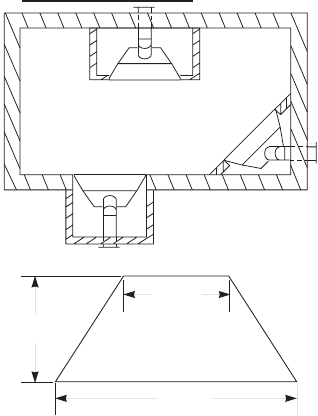
www.fmiproducts.com
116646-01J 5
sealed gas operating unit. It requires ap-
proximately 10-20 minutes of operating
time before the ame pattern stabilizes.
Figure 2 - Common Fireplace Locations
Flush with a wall
Through exterior wall
enclosed in a chase
Corner
installation
Figure 3 - Fireplace Bottom Dimensions
D
RW
FW
22
1
/
2
"
34
3
/
8
"
LOCATION AND SPACE REQUIREMENTS
Determine the safest and most efcient location
for your FMI PRODUCTS, LLC direct-vent re-
place. Make sure that rafters and wall studs are
not in the way of the venting system. Choose a
location where the heat output is not affected by
drafts, air conditioning ducts, windows or doors.
Figure 2 shows some common locations. Be
aware of all restrictions and precautions before
deciding the exact location for your replace and
termination cap.
When deciding the location of your replace,
follow these rules:
• Do not connect this replace venting to a
chimney ue serving a separate solid-fuel
burning replace or appliance.
• Due to high temperatures, do not locate this
replace in high trafc areas, windy or drafty
areas or near furniture or draperies.
• Proper clearances must be maintained.
• If your replace is to be installed directly on
carpeting, vinyl tile or any combustible mate-
rial other than wood, it must be installed on a
metal or wood panel extending the full width
and depth of the replace. See Figure 3.
• Your replace is designed to be used in
zero clearance installations. Wall or framing
material can be placed directly against any
exterior surface on the back, sides or top of
your replace, except where standoff spacers
are integrally attached. If standoff spacers
are attached to your replace, these spacers
can be placed directly against wall or framing
material. See framing details on page 6.
• If you plan on installing a television or enter-
tainment center recessed above your re-
place, it is recommended that you maintain a
minimum 18" above top of louver opening.
• When locating termination cap, it is impor-
tant to observe the minimum clearances
shown in Figure 7, page 7.
• If recessing into a wall, you can avoid extra
framing by positioning your replace against
an already existing framing member.
• Do not recess termination cap into a wall
or siding.
• You may paint the termination cap with
450º F heat-resistant paint to coordinate
with the exterior nish.
• There must not be any obstruction such
as bushes, garden sheds, fences, decks
or utility buildings within 24" from the front
16
5
/8"
CLEARANCES
Minimum clearances to combustibles for the
replace are as follows:
*Back and sides 0"
Perpendicular walls 6"
Floor 0"
Ceiling to louver opening 42"
Front 36"
Top 0"
Vent (See venting instructions for
specic venting clearances.)
Combustible material with a maximum thickness
of 5/8" may be ush with top front of replace.
* For back and sides of replace, do not pack with
insulation or other materials. 0" clearance to com-
bustible materials are for framing purpose only.
PRODUCT FEATURES Continued
• Fireplaces with the sufx of -HA have been
designed to operate at altitudes of 4000
feet and above.
PRE-INSTALLATION PREPARATION
of the termination cap.
• Do not locate termination cap where exces-
sive snow or ice build up may occur. Be sure
to clear vent termination area after snow falls
to prevent accidental blockage of venting
system. When using snow blowers, do not
direct snow towards vent termination area.
• For horizontal installations above 2,000
feet, it is recommended that a 12" extension
pipe be added before starter elbow and a
round horizontal termination be used (see
High Altitude Installation, page 16).


















